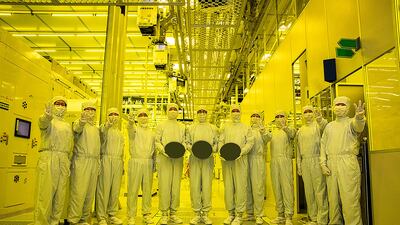Samsung Electronics, the world's biggest mobile phone and memory chips manufacturer, said its first-quarter operating profit plunged by more than 95 per cent, driven by a record loss in its key semiconductor unit as demand for consumer devices remained weak.
The company said its operating profit fell to 640 billion Korean won ($478.55 million), from 14.12 trillion won a year earlier, the company’s lowest operating profit since the first quarter of 2009. Samsung had issued guidance earlier this month saying first quarter profit would be 600 billion Korean won.
Revenue for the quarter declined 18 per cent to 63.75 trillion won, from the same period a year earlier, which was in line with Samsung's own guidance of about 63 trillion Korean won, but below the 63.9 trillion won estimates from analysts, according to Refinitiv.
Net profit at Samsung's semiconductor division posted an unprecedented 4.58 trillion won loss, a more than 154 per cent swing from a profit of 8.45 trillion won a year ago.
The loss was the result of “ongoing inventory adjustments leading to a decrease in overall demand amid an economic slowdown and weakened customer spending”, Samsung said in a statement.
In particular, demand for dynamic random-access memory chips, which are widely used in consumer electronics and other industries, was “sluggish due to inventory adjustments” and “with consumer demand for mobile and PC applications having not yet recovered”.
Shares of Samsung were flat in midday trading in Seoul on Thursday, but are up more than 15 per cent year-to-date.
The Covid-19 pandemic caused an unprecedented surge in demand for consumer electronics, catching the industry by surprise and upending supply chains, which led to shortages.
The semiconductor industry had a record 2021, with sales rising 26 per cent to $556 billion, its highest annual total up to that point, the Semiconductor Industry Association said. A record 1.15 trillion semiconductor units were shipped last year, it said.
The sector's revenue in 2022 rose by an annual 1.1 per cent to $601.7 billion, US research company Gartner reported earlier this year.
Samsung's semiconductor businesses benefited from that, as profit surged nearly 130 per cent annually to 8.84 trillion won and revenue jumped 43 per cent to more than 26 trillion won in the fourth quarter of 2021.
However, it took a sharp turn for the worse at the end of the fourth quarter of 2022, as the units recorded 270 billion won in profit and 20.07 trillion won in revenue in the fourth quarter of 2022, annual declines of 97 per cent and 23 per cent, respectively.
The overall semiconductor industry has battled a downturn following its spectacular rise, weighed down by inflation and recession worries in 2022 that weakened consumer demand, resulting in a glut of chip supply that has affected prices.
Samsung's Korean rival SK Hynix and Micron, the top US chipmaker, are scaling down their manufacturing to ease the squeeze in the industry.
Samsung earlier this month warned of its first-quarter results as it announced its own production cuts in its chip unit.
Scaling down its semiconductor operations on a large scale is an unusual move, given that it had only previously committed to making minimal adjustments in an attempt to maintain its market share.
Samsung, however, expects a gradual recovery in the second half of 2023, “as customer inventory levels will have declined due to inventory adjustments occurring since the second half of last year”, it said.
At the company's mobile unit, profit rose more than 3 per cent to 3.94 trillion won, from 3.82 trillion won a year earlier, despite a slowdown in the overall smartphone market, Samsung said.
The gain was driven by “strong sales” of the Galaxy S23 series launched in February, particularly by the high-end Ultra model, the company said.
Samsung also sees global supply chains as being “100 per cent stable” following a period of disruption when company operations were hampered, according to a regional executive.
The company is also recording increased demand, especially in the premium smartphone segment, which has remained “really resilient” to the challenges the industry faces, Fadi Abu Shamat, head of the mobile experience division at Samsung Gulf Electronics, told The National in February.


